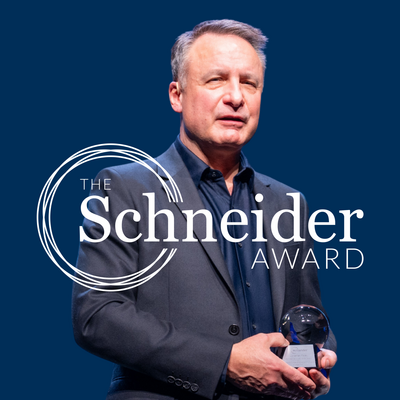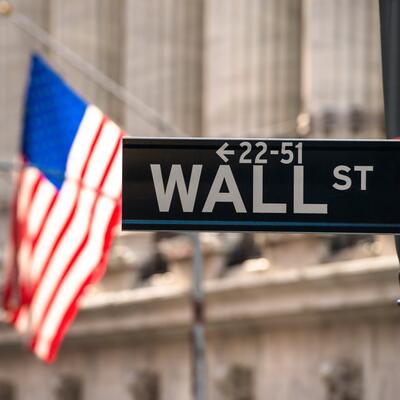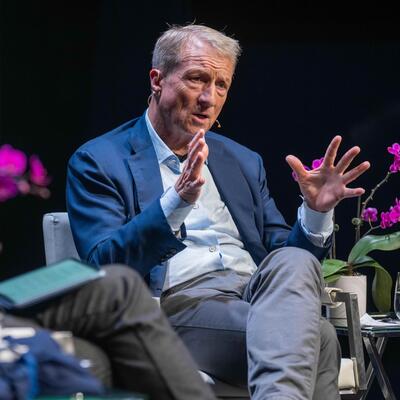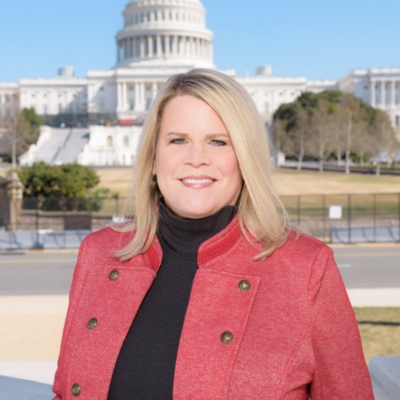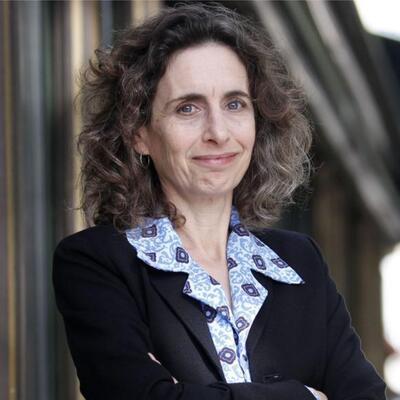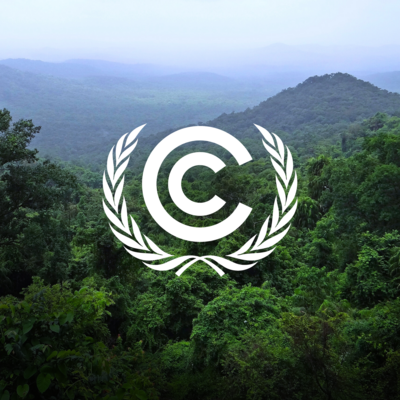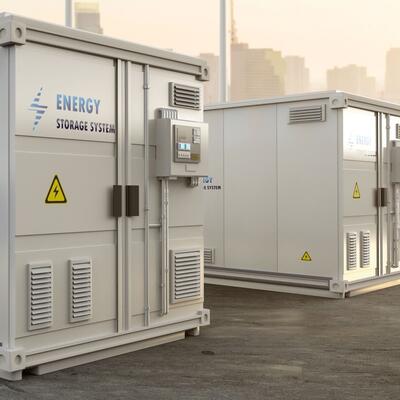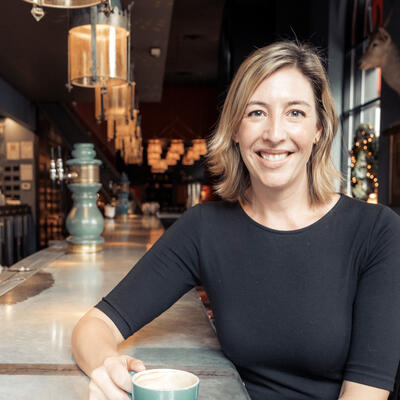
Molly Wood on Tech, Money and Survival
Guests
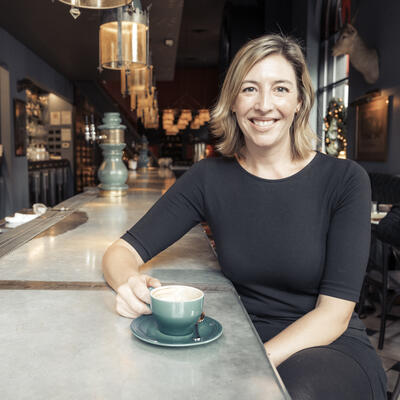
Molly Wood
Summary
After a 20-year career as a tech reporter for CNET and the public radio program Marketplace, Molly Wood has come to see the climate crisis as an engineering problem requiring a lot more investment. In one of her last journalism projects, she produced the acclaimed documentary podcast “How We Survive” for Marketplace.
Among the many stories in the podcast, she visits a brutally hot squatter’s community on federal land in Southern California known as “The Slabs,” where people are barely surviving. She also tells the story of human generosity during the aftermath of Hurricane Ida in New Orleans, where one man with solar panels and batteries lent his electricity to those in need during the days-long power outage. In the final episode of How We Survive’s first season, Wood says that there's one possible future where we adapt to climate change and avoid the worst impacts. And there's another possible future where we don't.
She says framing the climate crisis as an engineering problem gave her a path to explore resilience, adaptation and solutions.
“That's why I called that series ‘How We Survive’ because the eight-episode podcast was the culmination of about four years of ongoing reporting under that name. And it really was a very literal approach to, okay, well, how are we not gonna die when things start to get more and more terrible.”
Now, she’s moved out of journalism and into venture capital, where she sees greater potential for climate solutions through focused investments. “Money can actually enable a solution to be born,” she says.
“We always talk about how capitalism is the disaster, it is the market failure, it's the thing that's created this problem. Greed is the reason that we’ll never get out of it,” she says. “But also, [the climate crisis] seems like kind of a big business opportunity.”
“There's something very clean about venture capital. And it's like if it works, it makes a lot of money and if it makes a lot of money, it works. And when you look at that scale of the change that needs to happen, it needs scale. It needs to be consumer solutions that everybody adopts, not because they feel good about it but because it's the best possible thing to buy and do.”
She calls the Inflation Reduction Act “an absolute game changer,” because it will fund basic scientific research, which, once proven, can then allow venture capitalists like her to create a path to commercialization for new technologies.
“At some point, extinction is a really powerful motivator,” Wood says. “We might lose a lot of humans before we get to the point where we have to fix it. I do not want to sugarcoat that.”
And yet she is genuinely hopeful about human ingenuity finding ways to survive, and perhaps even be better off in the future.
Related Links:
How We Survive
Full Transcript
Note: Transcripts are generated using a combination of automated software and human transcribers, and may contain errors. Please check the actual audio before quoting it.
Greg Dalton: How much can capitalism help address the climate crisis? This is Climate One, I’m Greg Dalton
After a 20-year career as a tech reporter for CNET and the public radio program Marketplace, Molly Wood has come to see the climate crisis as an engineering problem requiring a lot more investment. In one of her last journalism projects, she produced the acclaimed documentary podcast “How We Survive” for Marketplace. She recently left that program to begin a new career in venture capital.
Molly Wood recently joined me for a conversation recorded in front of a live audience at the Commonwealth Club of California.
In the final episode of How We Survive’s first season, she says that there's one possible future where we adapt to climate change and avoid the worst impacts. And there's another possible future where we don't. She visits a squatter’s community in Southern California known as “The Slabs,” where people are barely surviving. I asked her what it felt like to be in a place where collapse has already happened.
Molly Wood: A lot of my reporting and thinking in life is inspired by sci-fi. And one of the things that I had read as part of sort of developing this series was Octavia Butler's Parable of the Sower trilogy. And we were planning this trip to this area of Southern California because we were visiting these big lithium deposits and doing these stories on battery technology and sort of realized that there was very nearby this community known as The Slabs. It’s federal land where people live for free. When you kind of head out there there's a sign that says it's the last free place. And it's outside of Palm Springs. It's unbearably hot. The people who live there measure their time in summers. They say you know if you’ve been here four summers for example that means you’ve been there four years because the summers are the hardest to survive. And people are there for various reasons. None of them are good. Some people go because they want to sort of test their survival skills but that's very uncommon it's you know, in the case of the people that I interviewed at the Slabs they were there because of you know domestic violence induced attempted murder and they were fleeing the person who had attacked them. And so, it's this kind of Parable of the Sower story come to life to be there but also to see people surviving and figuring out and really innovative ways to survive in the most extreme, you know temperatures that America at least has to offer.
Greg Dalton: In the middle of this blistering desert, Peter, Ryan and Jesse, these “slabbers” they call themselves or they’re called have cobbled together a little camp they call RabbitSide out of wood, an old RV odds and ends, and eight solar panels This and a bunch of golf cart batteries has to provide all their power needs. Let's listen to a bit of this episode, which we’ve edited for time.
[Playback]
Ryan: We have to cart in every calorie or drop of water that this takes to survive. And then, including like the water isn’t even out here naturally. So without that canal, without our hands doing all this and transferring that water around, none of this would last three months. If we were to just walk away, all of this would just dry up.
Molly Wood: How much time, as like, a relative percentage would you say you spend talking about powering your home?
Peter: I mean, it kinda feels like it comes up once a day.
Ryan: At least, yeah.
Peter: It’s often related to like, oh, do we need to turn off these items, or like, can we keep running this thing right now or does it need to be turned off because we have to conserve to last us overnight?
Ryan: You gotta do a lot of stuff. A lot of learning and it’s, it’s a constant battle, but it’s good to learn now before everybody has to learn real fast.
Molly Wood: Before everybody has to learn real fast, because like I said when I got to Slab City, this is what the end of the world looks like.
Peter: This place, ultimately it’s just kind of like the last default option for a lot of people. So like some people, like they’re on the run from something, some people like they couldn’t take care of themselves in any other situation, so like they, they lost their housing or whatever.
Molly Wood: And while Rabbitside is a triumph of invention, ingenuity, art, it’s not a utopia. It’s a future that we should try hard to avoid. Out here, says this little group, you have to have dogs to warn you if someone’s coming or to protect you if they do. There’s a baseball bat by the makeshift door. If you hear screaming at night, you don’t go outside. This, Jesse says, is the worst kind of preparation for the worst case scenario.
Jesse: Eventually it’s gonna end up being kind of every man for himself. That’s what it looks like. We don’t want to be in a bunker. Um, and you know, and just be eating rations and pretend like we’re already living in end times. But we do want to set ourselves up in case it does become every man for himself.
[End Playback]
Greg Dalton: So people don’t have to learn real fast. How likely do you think that scenario is and for how much of the world?
Molly Wood: I mean we’re talking every year there are some new crescendo of climate events. We’re talking at a point when 33 million people in Pakistan are learning that right now. I spend some time on Monday, you know, I’m great in the relative scheme of things and spend some time on Monday night sleeping outside of my house because the power was out for seven hours and it felt unsafe to be in the house. And so, at least I went outside where it was only 95 and you know could feel like somewhat legitimately scary. I think people are getting closer and closer to these realities all the time and starting to experience them with increasing regularity and no one is 100% immune.
Greg Dalton: And so, collapse can happen incrementally in different places at different times. Kind of one sort of pile at a time.
Molly Wood: Or was that famous ride slowly at first and then all at once.
Greg Dalton: Right.
Molly Wood: It’s not gonna be a bummer the whole time.
Greg Dalton: Yes. For sure. That’s because I promise talking about light and dark, we’re gonna do both.
Molly Wood: Everyone’s like whoa.
Greg Dalton: Yet it’s real.
Molly Wood: Yeah.
Greg Dalton: Pushing it away doesn’t make it go away. There's another set of scenarios where it's not every human for themselves where people use technology. We already have to help each other. You tell a story about Hurricane Ida in New Orleans last year when the storm hit there were about 200,000 people who did not evacuate, including Devin De Wulf, who stayed because his wife is an ER doctor. For many in the aftermath of the hurricane was even worse than the 150 mile an hour winds. Here's Devin De Wulf talking with you in How We Survive.
[Start Playback]
Devin De Wulf: We were without power for 10 days. Every day it was easily over 110°. That is really challenging when you can’t cool down anywhere, living without air-conditioning, you know it's fatal, potentially.
Molly Wood: At least 10 people died in New Orleans just from the heat.
Devin De Wulf: The worst thing, what I personally think was the worst was just looking at elderly people sitting in the shade kind of quietly suffering. The heat, you know, it took a toll on my 36-year-old body, but you know if you’re 80 or 90 years old that is really, really, really difficult to get through.
Molly Wood: Then there was a shortage of food and water.
Devin De Wulf: There are supply chain issues. No one has gasoline. People start to go hungry and at the same time there is massive food waste happening all around you. The longer you go in that situation you start to see people on edge, losing their temper a little bit. People are more and more stressed out, they are getting more and more desperate.
Molly Wood: But Devin did not lose power. His house was the only one in the neighborhood where the light stayed on because it runs on batteries.
Devin De Wulf: Our house has solar panels and two batteries. My house went through 10 days with no power easy-peasy because after the hurricane the sun will rise again.
Molly Wood: Devin’s house became the neighborhood charging station and literally help save lives.
Devin De Wulf: Mr. Roy needed an oxygen machine so I ran an extension cord from my house to his house to take care of that. I’ve got another elderly neighbor and I hooked up his refrigerator during the daylight when I have solar. And then on the front porch I just put an extension cord connected to a power strip and just a little sign that said, you know, phone charging station open 7 AM to 6 PM every day. And easily hundreds of people came by to charge their devices.
Molly Wood: And it's a good thing Devin had the solar panels and the home batteries because he says outside help never came.
Devin De Wulf: There's no police, there's no 911. There's no any support of any kind. We never saw any FEMA or city government or state government show up at all.
Molly Wood: Devin says you have to fend for yourself in almost every way and that includes generating your own backup power when the grid fails.
Devin De Wulf: So, I think the smartest thing we can do in Louisiana is just start to install solar panels and batteries everywhere.
[End Playback]
Greg Dalton: Molly, I hear in that a mix of technology, self-sufficiency, and altruism working together. But elsewhere in the series you expressed some skepticism about altruism, saying humans are humans. I’m curious how much do you think people will choose that path of putting their electricity out to help others rather than hoarding and thinking about themselves only.
Molly Wood: I mean I think that, you know, that Mr. Roy story makes me tear up every time I hear it, including now. I think humans really do want to help each other right up until the point where it gets too dangerous to do so, you know. And I think you sort of see that over and over in fiction and in real life, and I mean that’s like seems to be the entire plot of The Walking Dead which I'm too scared to watch. And so, as with everything I think there’s probably not one answer. It's where you are, what community you happen to be in, what works, what doesn't work, how dangerous the situation is. But certainly, what he described and he was gentle in our conversation but what he was saying was that they had managed to create sort of an island of cooperation and a really magical scenario, but that there were other things happening in the city during those 10 days that were incredibly dangerous.
Greg Dalton: Yeah, I think as climate kind of collapse unfolds, we’ll see the best and worst of humanity. I think of the Cajun Navy, these people when Louisiana floods and they drive around their boats and they’re taking grandma out of the house and like it’s like wonderful. And then there's others who are trying to exploit the volatility and profit and extract to make suffering people even worse off. We see both of those. You were a tech reporter, then a finance reporter before covering climate. Was there an aha moment when you realized you needed to be talking about climate? You’ve been in Silicon Valley longtime, when did climate really get you?
Molly Wood: I can't sort of pinpoint the moment when I started to it just sort of over the year started to feel really acute, like a story that I wasn't able to talk about and it was getting more and more frustrating. Because I feel like my entire adult life it'd been part of my conversation when I was a kid. It was like the ozone layer, and I was you know, kind of the early 90s. And so, our hairspray made us feel really guilty because there was lot of it. And it was always this kind of low-level awareness that got more and more and more acute as it became obvious how much worse it was gonna get. And then I had this I'm lucky enough to share a hairdresser with a really famous climate scientist from Berkeley, Inez Fung. And she was telling him, he relayed the story to me, I went on to interview her for the series, but he was telling me that you know in this conversation with Inez Fung who was one of the recipients of the Nobel Prize with Al Gore for Inconvenient Truth. She was saying, you know, I can write IPCC reports until the end of time, but the truth is we have already tipped. There are certain parts of the climate emergency that are not going to be avoided. We now know that the most recent I think IPCC report laid that out as clearly as ever, but this was 2015 or 2016. And she said so she was sort of laying out this plan to devote a big part of her career to studying the hundred-year effects. And she said she made this offhanded comment, she said it's an engineering problem now. And when he was telling me the story that was the moment, the aha moment where I said that makes it my story. Because I had been a tech reporter and sometimes when you cover tech and the world is happening all around you, you know, I covered business which is obviously a huge driver of many things but you feel like you're outside the main story. And that comment made me realize and I'm a pretty solutions-oriented person by nature too, it made me think like maybe there’s just a different way to look at this may be there is a tech story here and maybe there is a survival and the solutions are in. So, my initial entrée was actually adaptation and resilience. That's why I called that series How We Survive because the eight-episode podcast was the culmination of about four years of kind of ongoing reporting under that name. And it really was a very literal approach to like okay, well, how are we not gonna die when things start to get more and more terrible. And I had read Kim Stanley Robinson's New York 2140 which is about New York City post two fifty-foot sea level rises. And he makes this offhanded note in his book about diamond coating around the bottoms of buildings in submerged Manhattan to keep the water out so that they can still keep doing business, you know, it still is like the global financial center. And it was those I really started thinking to myself was anybody working on the diamond coating? Because if they are, I want to talk them. And that's what set me on this road.
Greg Dalton: This is Climate One. I’m Greg Dalton, and we’re talking with investor Molly Wood, about tech, money and survival in the climate crisis. Our podcasts typically contain extra content beyond what’s heard on the radio. If you missed a previous episode, or want to hear more of Climate One’s empowering conversations, subscribe to our podcast wherever you get your pods.
Molly Wood spent years at Marketplace, a show focused on business and economics. I asked if there was resistance to covering climate, which has been seen as an environmental and scientific story.
Molly Wood: It helped that I wanted to come at it from a tech angle. It also helps that I had almost complete editorial control over Marketplace Tech, the show that I hosted at that time. So, it was a very easy thing to start doing. It was hard to find startups and investors. And you know, it was sort of a slow, we were asking questions that people weren’t yet starting to answer in a really real way. And it probably took a solid year and a half to two years to really even launch the reporting because it took so long to convince people that it was gonna be worthwhile to go to Silicon Valley and knock on doors and say, hey, you guys promised us you are gonna save the world what are you doing about the world? Because reporters and editors have a kind of an aversion sometimes to questions that don't have answers.
Greg Dalton: And I wonder at Marketplace which is, you know, it’s the kind of business show on public radio, which is it follows the markets obviously believes in markets. If there was, you know, when did you come to think that like wow markets are part of the problem, capitalism. You know, climate is the ultimate market failure because we don't pay, we use the sky as a unpriced sewer. We don't pay the full price of the things that we do and the things that we buy. It's a market failure. So, did that ever get uncomfortable for you when did you start to realize that that connect?
Molly Wood: I think if anything, it was the opposite. I think what I found was that so many of the conversations about climate in media because media you know, even you see it still, heaven help us and figure it out editors. There is this sense that climate coverage is like vegetables. Like it’s the kind of bummer thing that you have to put on the plate and audiences don't respond to it. That's a big reason why it took me so long to start doing climate coverage in earnest because people thought no one was gonna listen to it.
Greg Dalton: Chris Hayes tweeted once that climate episodes are, they get terrible ratings.
Molly Wood: Right. Like if you want to not fill a room, talk about climate, or if you want to not have anyone listen to your story, talk about climate. So, I started thinking okay well, we always come at it from this huge recitation of unsolvable problems. We always talk about how capitalism is the disaster, it is the market failure, it's the thing that's created this problem. Greed is the reason that we’ll never get out of it. And I started thinking well, what if we thought about, one, technology and literal survival because it's here; figure out how to not die. But also, it seems like kind of a big business opportunity.
Greg Dalton: Well, John Doerr said this is the biggest opportunity for wealth creation of our lifetime, right, legendary.
Molly Wood: Yes, absolutely. And when you have a you know, potentially affected market which I now know as an investor we call it total addressable market of an entire planet, there's a lot of incentive. And when money is an incentive change can happen. And so, I really started pitching it as a business story like what is the business here. And there always being, you know, a big thing we talked about at Marketplace a lot was winners and losers. And in every big developing story or trend or disaster. There are winners and losers. And so, we thought it's a good framing for who to talk to and how to create stories. And that really led me to sort of look at it more and more as a who are the businesses who think that they can make money and make change.
Greg Dalton: Right. And now that’s pretty well-established. Wall Street is onboard, has been for a while. How did reporting How We Survive affect you personally?
Molly Wood: It should have provoked more climate anxiety than it did and it did in some cases. Certainly, members of the team, producers, got really upset about it, I think at that point I had been doing three or four years of climate coverage anyway so I maybe had some scar tissue although there are plenty of climate reporters who will tell you that they've had to stop covering it. But I genuinely, the more we talked about it and I think it's because of the focus felt and feel optimistic talking about solutions. It is encouraging to me and this might just be my personality, but to be able to take a problem and break it down into its component parts, like we know that the use of fossil fuels is it, right, that sort of the whole ballgame like what do we need to transition away from fossil fuels. Increasingly, experts are like oh, we need to electrify everything okay how do we do that? We do that with renewable energy. However, there was this realization that renewable energy was intermittent. You have to store it if you want it to be effective for a long time and then to store it, you need batteries and electric cars run on batteries. Okay, what's in batteries? Lithium, cobalt, right? It is actually an encouraging process to say any problem I want to solve I make it smaller.
Greg Dalton: Well, and psychologists say that doing something makes you feel better.
Molly Wood: Yeah, and that’s probably it. And we are making beautiful music for our podcasts and scripting and you know, and it was and we were out in the field reporting and talking to people and some of them are helpful. Now, none of that is to say I would say the greatest the biggest take away for me doing How We Survive was that you know people are always gonna be the enemy of people. That the hardest thing about tackling the climate crisis is gonna be like all the humans involved in tackling the climate crisis.
Greg Dalton: Humanity, well, this is a human-created problem, right?
Molly Wood: Yeah.
Greg Dalton: So, humans that's why the cognitive part of that. So, since producing How We Survive, you've pivoted from journalist to investor. Why?
Molly Wood: Yeah. I started my time as the host of Marketplace Tech with a big series about venture capital and how it works, and got to know a lot of VCs. We did a lot of reporting for How We Survive on the venture capital industry and how it, you know, had or had not tackled climate over the years. And I think it was sort of a combination of timing and a feeling that I wanted to be more proactive. Like I wanted to actually be implementing solutions. I wanted to have boots on the ground.
Greg Dalton: Dispersing information was not sufficient.
Molly Wood: Right. I sort of felt like I don't have time to change minds.
Greg Dalton: Or inform people. And so, your transition was from information to money and action. And you’ve been exposed to these people.
Molly Wood: Right. I happen to know one who wanted to hire me to write checks. So, I lucked out there.
Greg Dalton: That helps. So, what can money do that information can’t?
Molly Wood: Money can actually enable a solution to be born. I mean every day I talk to these; I’ve use this really messed up metaphor sometimes for all the companies that we talk to because I'm a very early stage climate tech investor. And we call them baby turtles, I call them baby turtles. Because we just we send them out toward the sea and we hope they make it.
Greg Dalton: And you know most will die.
Molly Wood: And we know most will not make it. But we hope that they will. But I will tell you that despite and we will get to talk about capitalism and we will talk about its ills and the problems that it’s caused. This is the most hopeful job I have ever had. I sincerely and I say that with respect to my former colleagues, particularly in contrast to journalism, where the job of journalist is to be skeptical, but the orientation of journalists has become to be only skeptical. And it is so frustrating and tiring to have to find everything that's wrong.
Greg Dalton: Yeah, my wife tells me all the time you're a downer. I’m like journalist write about the planes that crashed, they don’t write about the planes that land safely.
Molly Wood: Right. But then they start to expect that every plane is gonna crash and they start like looking around the plane for what's gonna go wrong. And it’s so wonderful to be in and it seems I know it seems antithetical to what you know about venture capital but it is sincerely an optimistic industry. We sit around and instead of you know, I don't know, laughing at the naïve absurdity of people who think that some things are gonna be like this because our 20 years of reporting tells us it's for sure gonna be like this. Like I remember listening to a series of presentations by founders in our office. And a woman got up and started speaking and she didn't seem very prepared and she was kind of awkward and she had a little bit of a strange delivery. And our general partner our boss, Jason, who you know a lot of people know is sort of a really brash like --
Greg Dalton: Swashbuckling.
Molly Wood: Yeah, not everybody loves him, sent us all the slack that said, never underestimate anyone. And we invested in her. And it truly is and especially so that’s like investing writ large. I’m talking to people who are trying to save the world. I’m talking to people who are like I'm taking this food waste and I'm using mushrooms to convert it into a gluten-free flour because I was inspired by the fact that my mom is diabetic and there's all this food that she can’t eat. And it turns out mushrooms can, you know, convert just about anything into anything else. And so, we’ve created a new feedstock at a time when we might not be able to grow food in huge portions of the world.
Greg Dalton: Right. And yet social impact investing seeking profits as well as social benefit is a growing part of capital markets these days. Yet, you decided not to join that realm and even rejected a company because they were a B corporation that's bound to pursue financial and social benefits. So, I'm curious why you didn't choose the sort of social impact path given that you are so climate mission driven. Was it because just you kind of fell into it and Jason offered you a job?
Molly Wood: I mean sure that’s definitely a part of it. There is who is trying to hire you at any given point. It has been, however, really interesting to then have those conversations since then and to, there's something very clean about venture capital. And it's like if it works it makes a lot of money and if it makes a lot of money it works. And when you look at that scale of the change that needs to happen it needs scale. It needs to be consumer solutions that everybody adopts not because they feel good about it but because it's the best possible thing to buy and do. Not in a moral way or not in a, you know, in a way about of caring about the world but just like it's the cheapest, best, most awesome thing. All my friends are doing it. Teslas look super cool. I do not have one for all of the reasons, but it worked. That worked. That created scale.
Greg Dalton: And so, you think you're going for like the real Alpha model because they’ll make the biggest things happen fastest.
Molly Wood: I think that if you look at lasting, times when there has been lasting change in certainly America and across the world. It’s always included a combination of awareness, activism, and economics. And I spent six years on a business show and I think economics really matters. It is in no way do I think we need to get rid of every other solution, but capitalism is a very effective global solution for making huge change. Good or ill.
Greg Dalton: So, Silicon Valley and the venture capitalists have funded have sold us on a lot of stories that didn't quite turn out to be as they presented.
Molly Wood: You journalist you.
Greg Dalton: So, for example, the Internet will democratize information. Now we know it's dominated by the FAANG companies, you know, Facebook, Apple, Amazon, Netflix and Google. Another VC story Silicon Valley that ride-hailing apps will reduce car ownership and congestion. We know that Uber and Lyft increased congestion. So, why should we believe them this time when they're saying we’re going to solve this energy problem, we’re gonna solve the climate problem.
Molly Wood: Oh my god, who am I right now? Because those are edge cases in an entire world filled with companies that venture capital has created that aren’t ruining everything. There will always be unintended consequences. There’ll be terrible outcomes. God help me, I'll probably back somebody who is awful. I hope not, but it could occur. But it doesn't mean that I should do nothing and it doesn't mean that you know these solutions can’t be born and be incredible. I mean this is also the industry that has produced Impossible Foods and Beyond Burgers and you know I mean like there are 42 climate tech companies that are worth over a billion dollars 42 climate unicorns. Some of them will have bad end and capitalism is basically like any other organism unregulated and left to grow unchecked, it will hundred percent kill us all. A hundred percent, I have no illusions about that. I do not think this is like the winner, but it's the system that we have on the globe at the moment that has produced the most outcomes.
Greg Dalton: So, are you personally conflicted about becoming more of a capitalist? You used to cover capitalist now you’re becoming one.
Molly Wood: Definitely. It’s a really confusing time in my life. I mean it’s not just that I went from journalism to venture capital. I went from public radio to venture capital like I legitimately I've been keeping this audio diary of you know, like entering the white-hot center of the culture wars and become a capitalist at the same time. And it's a really weird time I'm not gonna --
Greg Dalton: And super dominated by tech bro, alpha and testosterone land.
Molly Wood: Oh, for sure. I resisted venture capital for a lot of years for that exact reason. I was like do I really want to go to parties with the worst people in the world? Sorry, new colleagues wherever you are. I don’t mean you.
Greg Dalton: So, but that’s where we are and rather have them with us than against us, right?
Molly Wood: Well, and that to be fair, that is before I knew like when Jason, you know, made an overture about me coming to work there. I said what do you think about doing climate tech investing? And he was like yeah, let's do it. I'm all for it. So, had I gone to venture capital earlier I might have felt much more conflicted. But the more there's been this incredible rush of people going into climate investing and they’re amazing. I mean they are really are genuinely phenomenal people. So, I feel like I'm actually in a cohort of this industry that, yes, like everybody who is doing it understands that the goal is for everyone to make a lot of money, but also create something incredible. I was talking with my dad about this, I mean this was like not something that would ever occur to me. But my dad was like, I love to hear this is so amazing there's like there are gonna be companies, you’re creating jobs. And I was like, actually that's true. We have an internal slack for founders for the people that we have funded. And they have a channel in this I called small wins. And they'll post things that just are incredible like we made our first hire today. We hired five people today, this is, you know, so we’re actually doing it we’re growing we’re creating a real thing in the world. Some of it, you know, and I don't think that making stories and making videos and making podcasts. We creators we are making a real thing and a real product. This is that times….
Greg Dalton: It’s different. Yeah.
Molly Wood: It’s just a real.
Greg Dalton: Right.
Molly Wood: We only hear about Adam Neumann and Travis Kalanick and the people who you know don't have any morals or like do these terrible things in the world or get out over their skis and commit fraud trying to cover it up. But founders as a class of people are phenomenally hopeful. And my God do they work harder than any of the rest of us.
Greg Dalton: According to Bloomberg, venture capital and private equity invested more than 53 billion in climate tech last year. Where is that going how much of it is motivated by absolving guilt, fear?
Molly Wood: That’s the one I’m talking about. So, the pandemic happened. And a lot of people I think realized that the worst case can occur. And all of a sudden that really did genuinely catalyze I think a lot more awareness and a lot more money around climate. Like they said okay, well, the next apocalypse, right, we just had one and the next apocalypse is climate change. And a lot of new people and new money came into climate tech investing which is wonderful. I do not doubt at all that fear is a huge part of that. But if you think venture capitalists are sitting around feeling guilty about stuff, no.
Greg Dalton: No, there’s huge opportunity.
Molly Wood: Definitely not.
Greg Dalton: Huge opportunity in disruption, wealth creation.
Molly Wood: And some are. I’m being very flip. Some are, some really, I know of several venture capitalists who actually retired early from you know, just being VCs to start to work on climate. To say okay I got to do something good with --
Greg Dalton: Right. I think this is before you were in this. But I'm old enough and been in this long enough to remember when, you know, Kleiner Perkins had their first green tech fund and Vinod Khosla was out there talking about this, you know, the Google founders were saying renewable energy is less than coal and this is not the first time Silicon Valley has said we’re big on climate. But for the first time they did it they got burned because they realized that steel and concrete is not software and it's harder capital investment and it's regulated it's harder than they thought. So, you think they've learned this time that like from that first time that to do it this time?
Molly Wood: There's certainly more interest in software, than I wish was the case. Although what I think we’re gonna find, we probably have learned that lesson and then there will be 50 other things we screw up. That's just sort of the nature of cycles. But, you know, it's been interesting that John Doerr for example Kleiner Perkins invested I think a billion dollars in various solar technologies and other renewable energy. It was really, really focused on renewable energy that early boom. And I think the life of a venture capital fund as a legal structure is 10 years. That's why VCs I always talk about this 10-year life cycle of things. And it's because there literally is an end date of 10 years when investors want their money back plus hopefully all of the money you’ve made them in that time. Over 20 years, though, John Doerr’s investments made Kleiner Perkins $2 billion on the original billion. So, you know we talk about it as a really big failure, but a lot of it --
Greg Dalton: It took longer than expected and ultimately like, yeah.
Molly Wood: Yes. But a lot of those businesses still exist and, you know, I think you could argue that that is when the solar industry was born and although it was like awkward baby deer steps now we have something that's pretty mature and that's a good thing overall. What I think that we are going to now figure out is that a lot more entities are finally getting serious about climate, including governments, including businesses, including Wall Street, you know, the SEC, central banks will probably create a lot more change than we even realize they are even more than governments because politics is messy about all this. We might find that there are certain categories that venture capitalist is better suited for, and maybe some of that is software. And that's fine and maybe it is better for governments and universities to fund hard science and deep research. And I've met with several companies that are trying to do like really complicated things about microbes and alternative rocket fuels and really phenomenal things that might be outside my scope or ability to invest in because they will take longer than 10 years to pay off. But there are also a lot more funds dedicated to that kind of investing now. And they have longer fund structures or they have different kinds of investors who are willing to wait longer. So, I think there's more diversification in the types of investing that VCs are going to do and we might just be trying to figure out like what's the part that we should do compared to the part that governments should do.
Molly Wood: That is an absolute game changer. It is a huge deal. Because all of that is the research that the reason that scientists are coming to venture capitalists which shouldn't be happening is because governments haven’t been funding science.
Greg Dalton: Right.
Molly Wood: You know, we all know that that's not the right model. That we are gonna have to say like I'm really sorry this is a genius idea could probably change everything but I just don't have that kind of time and my investors don't want me to do that. That's an awful thing to be saying, but it's also 100% true. It's the job of universities and governments to fund basic science and basic research. And the fact that we’re gonna now do it and then create a path and then I'll be there at the end to create a path to commercialization for these phenomenal technologies. That's a healthy ecosystem. That's what should be happening.
Greg Dalton: Right. And that's what happened with semiconductors they did so many things that’s happened before. We proved that that works in other realms.
Molly Wood: Yeah, it's another. It's truly amazing like there is really genuine hope and celebration about this.
Greg Dalton: How do you view the role of the climate billionaires, Tom Steyer, Mike Bloomberg Bill Gates, John Doerr, Richard Branson, these people. Some people look very like hooray like you know these big players are now putting their muscle and their celebrity and brand into the game. And other people say like, distrust them because they’re such creatures of this, you know, hyper capitalism.
Molly Wood: I mean, right, call me when you guys live in like a tiny house or your consumption is not a, what is it, 65,000 square-foot house in Seattle that Bill Gates owns.
Greg Dalton: He buys offsets. He flies a lot of private jet miles and he buys offsets. So, but, you know, these guys have a lot of smarts and they definitely attract attention and capital.
Molly Wood: I'm all for it. I mean, I really like there's a lot to be cynical about and we should. And also, everybody get in the pool. I want it all. I want everybody talking about it. I want everybody funding it. I want every, you know, like there is no one that I'm going to turn away at this point. I'm thrilled that that's happening because you know I sort of can't level a moral judgment about the world that we live in, in that regard. Like maybe I don't like everything or anything about Bill Gates. But if Breakthrough Energy fund can create the you know little tiny nuclear reactor in a backpack that allows us to desalinate enough water on the California coast to survive, great. Please do it.
Greg Dalton: Right. The way I look at those guys is people will listen to them who will never listen to Al Gore or others. Like certain people, they’re trusted messengers in important circles.
Molly Wood: Well, they know how to make money and money gets solutions. Money, it works.
Greg Dalton: Right. What sector of technology do you think will give us the best hope of survival? What are you most excited about?
Molly Wood: Well, I'm really genuinely excited about the basic research. I think that some of that and whether I can invest in there or not I think there are some incredible things happening around using nature-based solutions. And there is, you know, apparently there are like thousands of microbes that we don't even know anything about, but you can, to take these microbes and turn them into like different kinds of fertilizer that don't use nitrogen. I mean there's really --
Greg Dalton: The soil people are the biggest optimists that I come across.
Molly Wood: Yes.
Greg Dalton: And it’s like soil is sexy. Soil is a big deal. It’s like, if the soil people are right and those things can really scale, we can all breathe a little easier.
Molly Wood: Soil is super sexy. There is a lot of really incredible regenerative agriculture technologies coming out all the time. There is a company that I'm really trying to figure out how to invest in that is making seeds, literal seeds to sort of go up against Monsanto that can signal… they’re bioengineered to signal when they're sick before they are dead. And you can see the signal from space. And then you can reduce dramatically the pesticides that you have to spray, right. Like now we just spray and pray crops like crazy and if we have these visual signals that are like there's a mold infestation you can treat it at the spot, you can have healthier crops overall, you can have healthier soil overall, like it's the sort of incredible flywheel effect. And the other one that I actually think is a dark horse is like what they sometimes called blue tech, but ocean technologies. So, there’s, you know, 2500 vegetables that none of us have ever gotten to eat. They just grow in the ocean. There are algae you know varieties that are effectively like total protein replacements. And algae itself is a huge carbon sink. Like it's very possible that in 50 years the thing that will be like, oh, duh, about is the ocean is the best possible solution and we hardly know anything about it.
Greg Dalton: Right. And it’s been taking the biggest hit without the oceans absorbing a lot of heating it’ll be so much hotter now and not to mention feeding the cows so they burp and fart less and that would help an awful lot. What do you think about climate philanthropy as opposed to other things? Does that have a role is that on your radar because a lot of these billionaires have a philanthropic arm as well as an investing arm? Is there a role for the philanthropy to do things that --
Molly Wood: Climate is 2% of philanthropic giving right now. 2%, MacKenzie, what’s her last name now Bezos, not Bezos anymore. Scott.
Greg Dalton: MacKenzie Scott.
Molly Wood: MacKenzie Scott has given away a phenomenal amount of money and I think that a grand total of like $5 million of that has gone to climate. That is probably one of the most frustrating failures that I can think of at this exact moment. There was actually a huge positive development in this regard, a few weeks back The Rockefeller Foundation announced that having turned its attention to vaccines and vaccine distribution, it was now going to pivot the organization toward climate, which is huge.
Greg Dalton: Right. Particularly given their legacy of, you know, that’s oil money where that wealth came from. So, that gets to, you know, the whole question of we’ve been talking about incentives you know positive making money. What role is there for pressuring companies, environmental social governance is very popular these days pressing companies to be less bad. I’m gonna divest from fossil fuels. Is there a role for that? Is that constructive or is that villainizing business?
Molly Wood: No, that's how we get change 100%, right. That's how we apply financial incentives to businesses which gets them to change. I talked to people all the time who talk about what consumers want now that they didn't used to want. And when I think actually about sometimes, I joke actually that I’m one of the last investors in the climate space who really believes in the consumer. I really profoundly believe in the power of the consumer to drive change. We always talk about this collective problem and how individuals can possibly have an impact and that lets us kind of off the hook for it's just business’s problem to fix which it is and also ours, right. Everyone in the pool and I look at something like high fructose corn syrup as an example. We had activism and awareness that let us know that high fructose corn syrup is like poison in any amount. And so, as a body of consumers, a collective made up of individuals. We said we don't want that in our food anymore. And for the most part it went away. And I believe so powerfully you see all these companies who are doing circular economy type things. They’re creating a way to take back used goods for example, or tell you what to do with their packaging when you're done with it. All of that is the result of consumer pressure. And so, and then you look at something like the Exxon board takeover. There were activist shareholders who took two or three board seats at Exxon who did it not because they said you know we’re just do-gooders and we want to do the right thing.
Greg Dalton: No, those are hard-nosed business people who think there's a better way to use that capital.
Molly Wood: Yes. It's bad economics to be a bad actor around the climate. And I 100% think that that message can come from consumers, from other businesses. There's no, you know, we’re seeing another I also share a hairdresser with a renowned economist. My hairdresser is like a nexus. I'm his like loser client in terms of who he cuts the hair of, who said, you know, everybody came out of COP 26 really bummed out because governments didn't make the big moves that we were hoping that they would. In fact, even if every government agrees to every promise they made at COP 26 we still won't make 1.5° of warming. But the thing that did come out of COP 26 was a whole bunch of banking. A whole bunch of financial institutions starting to make major changes in regulations because risk is a really big motivator. And we are to the point where from a global financial standpoint we’re talking about a risk of zero. We’re talking about like insurance and reinsurance companies saying there are entire parts of the globe that will not be insurable. Meaning there's no economic activity there you can't build there no people can live there there's climate migration. Like that risk is behind-the-scenes regardless of what governments are doing driving trillions of dollars in the right direction.
Greg Dalton: Right. They’re starting to see that and in meaningful timeframe that’s coming in closer. Still, we’re talking about compounded quarterly earnings growth. That's what drives earnings. That's what drives the markets. Eventually the companies you’re investing in wanna have an exit they want to go public or be bought. Can we continue to have compounded quarterly growth of more, more, more, more stuff on a limited planet. Because you did the mining story you admitted I think, like you had this sort of wonder and kind of fear of a 14-year-old looking at that the mining operation. So, we’re still locked in a system of more.
Molly Wood: We really are and that is --
Greg Dalton: Never enough.
Molly Wood: -- the paradox that I completely acknowledge. I don't know how we I think all of these things have to happen in tandem. We are realizing that again growth of any organism would kill you.
Greg Dalton: Cancer is the only thing that grows perpetually. So, that’s why there’s degrowth there.
Molly Wood: Right. So, there’s this conversation about degrowth. There is an increasing conversation about stakeholder capitalism. There are conversations about changing the way that companies report the way that they think about profits, all those things have to happen at the same time.
Greg Dalton: So, summing up here. You've been nine months from your shift from reporter to investor. Has it changed you personally how you feel about the future?
Molly Wood: I am weirdly hopeful. I really am. I think that the awareness is at a crescendo and there's a lot of fear and anxiety but it is driving a lot of real change. And people are so ingenious, you know, it's really easy to think that our kids will live in this sort of terrible future because of all of this happening, but there's almost equally a chance that they could live in like an energy utopia. There was a great Bloomberg piece of sort of a thought exercise in imagining what we could do with unlimited energy. And it's pretty remarkable to think what we could solve at that point. And I'm starting to see companies design solutions that are like purpose built for the cheapest electrons on the planet and even including the intermittency. So, it's fine if the sun is not shining all the time we built a manufacturing process that works with that and is phenomenally cheaper as a result. And I love the idea of just trying to change that mindset, because it’s in no way is it a barrier, right, it's just an enabler like the 4G transition is a perfect example of what can happen when you go from scarcity. So, we had a scarcity of mobile bandwidth on 3G and there was only so much stuff we could do. And then 4G came and an entire economy was built on top of it. Like apps that we would never think about being able to exist because there was just ubiquitous broadband access on their phones. Like we started to think about what we could do with energy in that way. There's nothing we can’t accomplish. Look, at some point extinction is a really powerful motivator. We might lose a lot of humans before we get to the point where we have to fix it. I do not want to sugarcoat that. This is not a good, this is not gonna be a good future. However, we are gonna figure it out. Every time we have faced extinction before we invented fire or the wheel or electricity or penicillin or agriculture and there were terrible unintended consequences as a result of all of those things but like we the species didn't die. I genuinely think we’re gonna figure it out. And I think the sooner we do it the better off people really truly could be.
Greg Dalton: On this Climate One... We’ve been talking with investor and reporter Molly Wood about tech, money and survival in the climate crisis. Find her podcast “How We Survive” on your favorite pod app. Climate One’s empowering conversations connect all aspects of the climate emergency. To hear more, subscribe to our podcast on Apple or wherever you get your pods.Talking about climate can be hard-- but it’s critical to address the transitions we need to make in all parts of society. Please help us get people talking more about climate by giving us a rating or review if you are listening on Apple. You can do it right now on your device. You can also help by sending a link to this episode to a friend. By sharing you can help people have their own deeper climate conversations.
Brad Marshland is our senior producer; Our managing director is Jenny Park. Our producers and audio editors are Ariana Brocious and Austin Colón. Megan Biscieglia is our production manager. Our team also includes consulting producer Sara-Katherine Coxon. Our theme music was composed by George Young (and arranged by Matt Willcox). Gloria Duffy is CEO of The Commonwealth Club of California, the nonprofit and nonpartisan forum where our program originates. I’m Greg Dalton.
